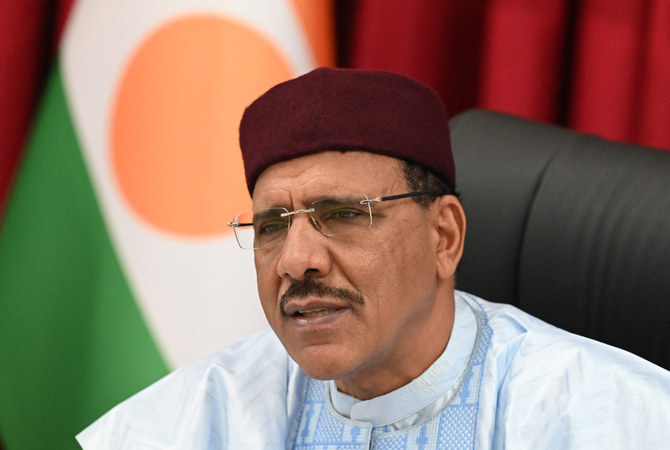NIAMEY, Niger: Niger’s detained president was seen by his doctor on Saturday, his entourage said amid mounting concern for his condition, while Nigerian religious leaders met the officers who seized power last month to try to defuse the crisis.
The Muslim leaders visited the capital Niamey with the blessing of Nigerian President Bola Tinubu, head of the West African regional bloc ECOWAS, a source close to the delegation told AFP.
ECOWAS has approved the deployment of a “standby force to restore constitutional order” in Niger as soon as possible, but scrapped a Saturday crisis meeting on the coup that deposed Mohamed Bazoum.
Bazoum, 63, was toppled on July 26 by his presidential guard, which has since held him and his family at his official Niamey residence.
The European Union, the African Union and the United Nations joined others in sounding the alarm for Bazoum on Friday after reports described worsening detention conditions.
Bazoum “had a visit by his doctor today,” a member of his entourage told AFP, adding the physician had also brought food for Bazoum, his wife and son.
“He’s fine, given the situation,” the source added.
Human Rights Watch said it had spoken with Bazoum earlier this week. The ousted leader had described the treatment of himself, his wife and their unwell 20-year-old son as “inhuman and cruel,” HRW said.
“My son is sick, has a serious heart condition, and needs to see a doctor,” the group quoted him as saying. “They’ve refused to let him get medical treatment.”
UN rights chief Volker Turk on Friday said Bazoum’s reported detention conditions “could amount to inhuman and degrading treatment, in violation of international human rights law.”
Top US diplomat Antony Blinken said he was “dismayed” by the military’s refusal to release Bazoum’s family as a “demonstration of goodwill.”
The delegation of Nigerian religious leaders was received by newly appointed Prime Minister Ali Mahaman Lamine Zeine in Niamey, and then strongman General Abdourahamane Tiani, according to Niger’s national television.
The group was headed by Sheikh Bala Lau, leader of the Izala Salafist movement in Nigeria, Niger’s ANP press agency reported.
A source close to the delegation told AFP they had left on the mandate of Tinubu “to douse tension created by the prospect of military intervention by ECOWAS.”
“The clerics are in Niamey to explain to the junta leaders that Nigeria is not fighting Niger and that the decisions taken on Niger are not Nigeria’s but those of ECOWAS as a regional bloc,” the source added.
Lau had earlier in the week led a delegation of clerics who met with Tinubu in Nigeria’s capital Abuja where the mission was discussed, the source said.
On Friday, West African leaders suspended the crisis meeting that had been set for Saturday in Ghana’s capital Accra. Chiefs of staff from the Economic Community of West African States (ECOWAS) cited “technical reasons.”

Sources said the meeting was originally set up to inform the organization’s leaders about “the best options” for activating and deploying the standby force.
“The military option seriously envisaged by ECOWAS is not a war against Niger and its people but a police operation against hostage takers and their accomplices,” Hassoumi Massaoudou, foreign minister in the ousted civilian government, said Saturday.
ECOWAS is determined to stop the sixth military takeover in the region in just three years.
It has severed financial transactions and electricity supplies and closed borders with landlocked Niger, blocking much-needed imports to one of the world’s poorest countries.
ECOWAS had previously issued a seven-day ultimatum to the coup leaders to reinstate Bazoum, but the generals defied the deadline, which expired on Sunday.
Thousands of coup supporters rallied in Niamey on Friday to protest against the ECOWAS plan to send troops.
Protesters gathered near a French military base on the outskirts of Niamey shouting “Down with France, down with ECOWAS.”
Niger’s new leaders have accused former colonial power France, a close Bazoum ally, of being behind the hard-line ECOWAS stance.
France has around 1,500 troops in Niger as part of a force battling an eight-year jihadist insurgency.
It is facing growing hostility across the Sahel, withdrawing its anti-jihadist forces from neighboring Mali and Burkina Faso last year after falling out with military governments that ousted elected leaders.




























